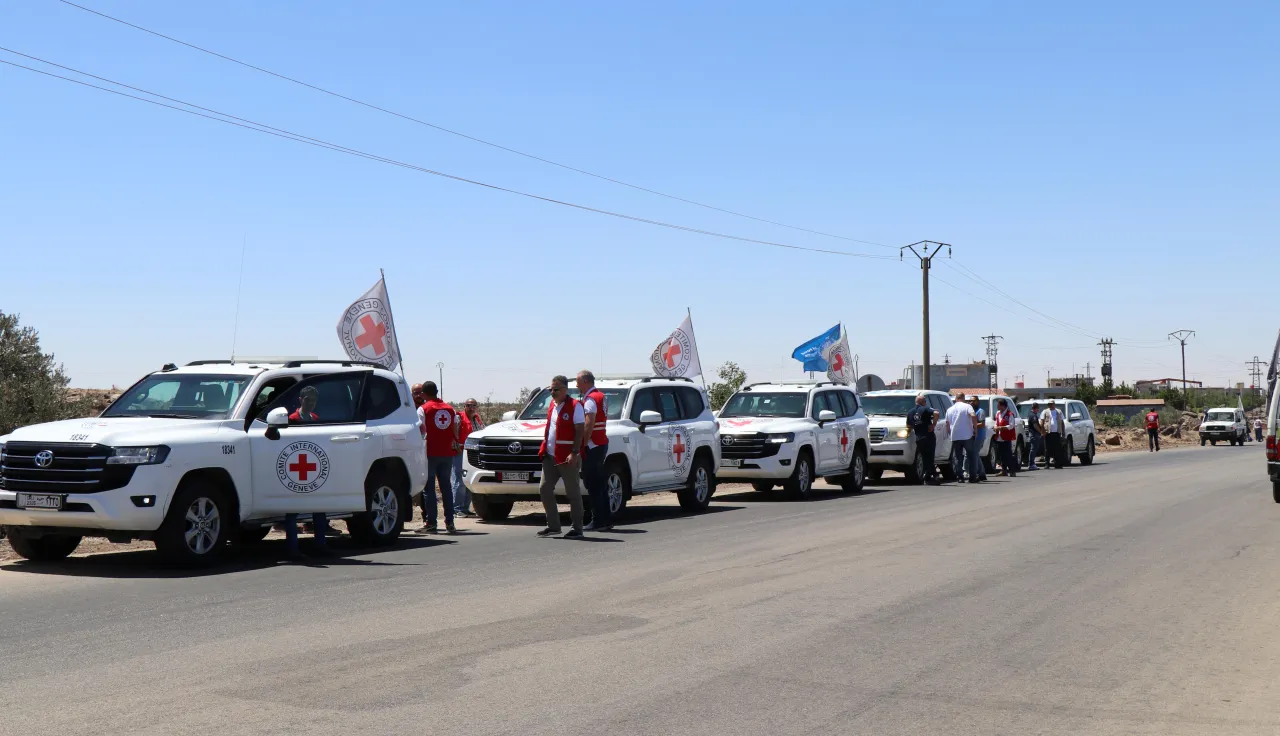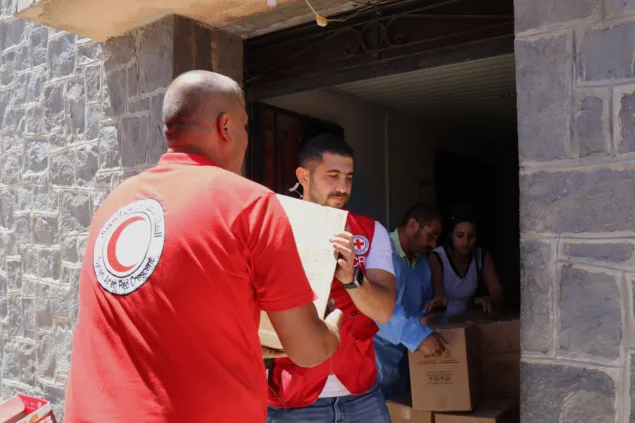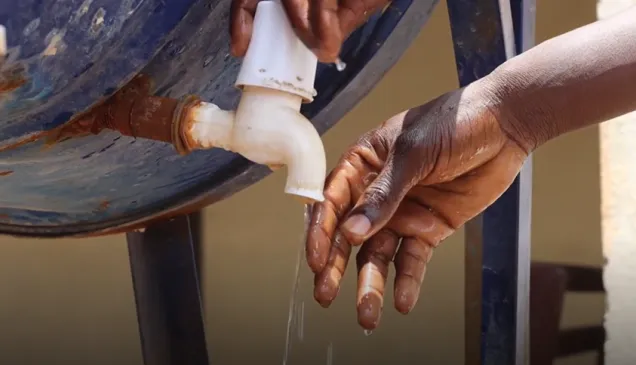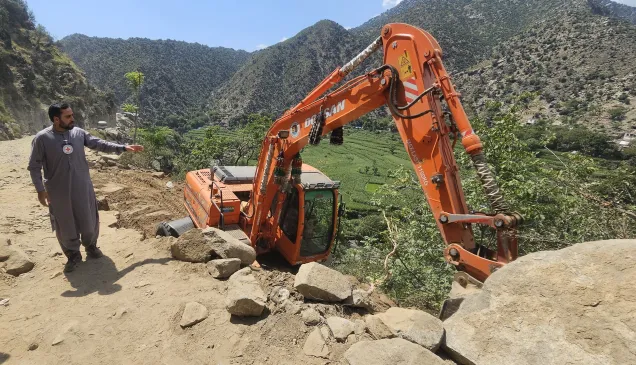ICRC response in Southern Syria: Operational update

Since 13 July, the International Committee of the Red Cross (ICRC), together with the Syrian Arab Red Crescent (SARC), has been fully mobilized to respond to some of the most urgent humanitarian needs of people affected by a new wave of violence in southern Syria.
Following a sudden escalation of violence in Sweida Governorate, over 1,500 lives have been tragically lost, hundreds of homes have been destroyed or abandoned, and the livelihoods of over 800,000 people have been disrupted. Access to essential needs such as food, water, medical care, electricity, fuel and shelter has become a daily struggle for most affected communities.
In Sweida, the prevailing situation has halted commercial activity and restricted the movement of people for several weeks. The banking system remains entirely disrupted, leaving the population largely dependent on humanitarian convoys, primarily organized by the SARC with support from the International Red Cross and Red Crescent Movement, United Nations agencies and other humanitarian partners.
As of 10th August, it has been estimated that 192,000 people have been displaced across Sweida, Dara’a, and Rural Damascus. Sweida has been the most affected, with nearly 131,000 people displaced within the governorate. An additional 58,000 people have moved from Sweida to Dara’a, while smaller groups have sought refuge in Damascus and Rural Damascus. Most displaced families are staying with host communities, makeshift shelters, or schools, placing immense pressure on already overstretched local resources.
Since July 28, ICRC teams have been on the ground, in partnership with the SARC, listening to local institutions and families, delivering life-saving assistance, and working to restore a sense of dignity and safety amid the ongoing turmoil.
Emergency response
Support to life-saving and other healthcare services
Since the onset of the crisis, hospitals in Sweida, Shahba and Dara’a have been under severe strain due to a large influx of casualties and disruptions in essential services such as medical supplies, food, electricity and water. The overwhelming scale of healthcare needs has quickly depleted available resources, placing immense pressure on medical services and personnel. Reports have also indicated many attacks on healthcare workers and facilities, further compromising the already fragile healthcare system.
To help address the most urgent gaps, the ICRC has provided support in the form of critical medical items such as weapon-wounded kits—each sufficient to treat 25 severely injured patients. A total of seven kits were distributed to Sweida National Hospital, Shahba Hospital and Dara’a National Hospital. Additionally, three primary health care kits, each covering the needs of 10,000 patients for two months, were distributed to SARC Sweida Mobile Medical Teams, the Sweida Directorate of Health and the SARC Daraa Mobile Health Unit.
To strengthen emergency response capacity, eight first aid and pre-hospital emergency kits were provided, four each to SARC Emergency Medical Services in Sweida and Dara’a.
Support for non-communicable diseases was also prioritized, with the delivery of diagnostic equipment, consumables, medication, and 8,700 vials of insulin, distributed centrally by the Ministry of Health through the Directorate of Health, along with five cold boxes to ensure proper storage and transport.
Addressing basic daily needs
The escalation of violence also caused shortages of food in Sweida and for displaced families in Dara’a. While humanitarian assistance has started to flow, the situation remains dire and will require more sustainable solutions.
In Shahba, a city in rural Sweida,1050 parcels of canned food were distributed to internally displaced families.
To address some of the initial needs, 500 food parcels were delivered to Sweida National Hospital and Shahba National Hospital’s staff, patients and their accompanying family members, to ensure the medical team could continue operating effectively and those receiving care had access to sufficient nutrition during their recovery.
In Shahba, a city in rural Sweida, 1,050 parcels of canned food were distributed to internally displaced families.
To support families displaced from Sweida to Dara’a and Saida Zeinab, the ICRC, together with SARC, delivered essential relief items across several sites. In Saida Zeinab, 700 canned food parcels and 800 kilograms of dates were distributed. In Al-Sahweh, where displaced households have taken refuge in schools now turned into shelters, the ICRC supported three sites with 400 parcels of canned food and 1,600 mattresses.

Access to clean water and hygiene
Water access in Sweida is critically limited. Fuel shortages and long hours of electricity cuts have disrupted water supply systems, forcing families to rely on costly and unreliable private sources. In Sweida, 25,000 large bottles of water were delivered to Sweida National Hospital and Shahba Hospital. These deliveries are aimed at ensuring that both staff and patients have consistent access to clean, safe drinking water.
In Saida Zeinab, rural Damascus, 20 water tanks (2m³ each) were installed across 20 locations to support 700 families. This intervention increased storage capacity and improved access to clean, reliable water.
In Sahweh, rural Dara’a, displaced families in five shelters received comprehensive support, including 400 sets of hygiene and cleaning supplies, trash bin installations, flood lights and sanitation system maintenance. Workers are also mobilized daily to keep living areas clean and safe.
To help families maintain good hygiene, 4,200 hygiene kits were distributed, 2,000 in Shahba, rural Dara’a, and 2,200 in Salkhad, rural Sweida. Each is tailored to meet the needs of a household of five for one month.
Protection and prevention
Since the outbreak of violence a month ago, the ICRC has consistently urged all actors on the ground to protect people, preserve human dignity and to ensure that humanitarian aid workers can reach affected populations safely, consistently and without obstruction. The ICRC continues to stress that access to essential services, medical care and lifesaving assistance must be maintained at all times. Some level of normalcy must be restored as soon as possible, in particular, safety, free movements of people and goods, and resumption of banking services.
Protection of Family Links (PFL)
In the past month, many families were forced to flee due to the escalating violence, leading to separations and loss of contact with loved ones. The ICRC, through its Protection of Family Links (PFL) programme, has been speaking with affected families and registering cases of missing relatives. In these tragic circumstances, we work to reconnect people and help restore hope by tracing those who have gone missing and supporting families in their search. At the same time, in line with its mandate, the ICRC has approached all sides to offer its services to visit persons deprived of freedom and facilitate, as a neutral intermediary, their release following an agreement by all sides.
Supporting dignified treatment of the dead
The ICRC has provided body bags to Sweida and Shahba hospitals to support their capacity in managing a large number of deceased individuals. In addition, body bags and personal protective equipment (PPE) were donated to SARC and the Forensic Identification Centre in Damascus. SARC volunteers received technical support to ensure proper documentation is done during the process of the recovery and management of dead bodies, which is vital for preventing further disappearances by helping with future identification and returning of the mortal remains to families.
To further strengthen forensic capacities, the Directorate of Forensic Medicine received 1,000 body bags, 900 disposable gowns, 20,000 surgical gloves and 1,000 masks. The ICRC also supported SARC volunteers with technical guidance, the provision of body bags and PPE, to enable the dignified recovery and management of dead bodies.



